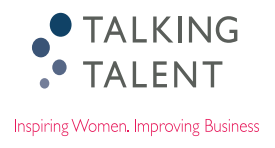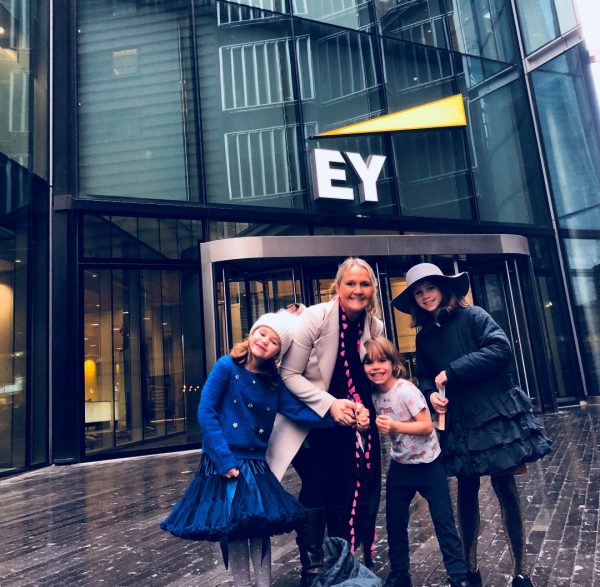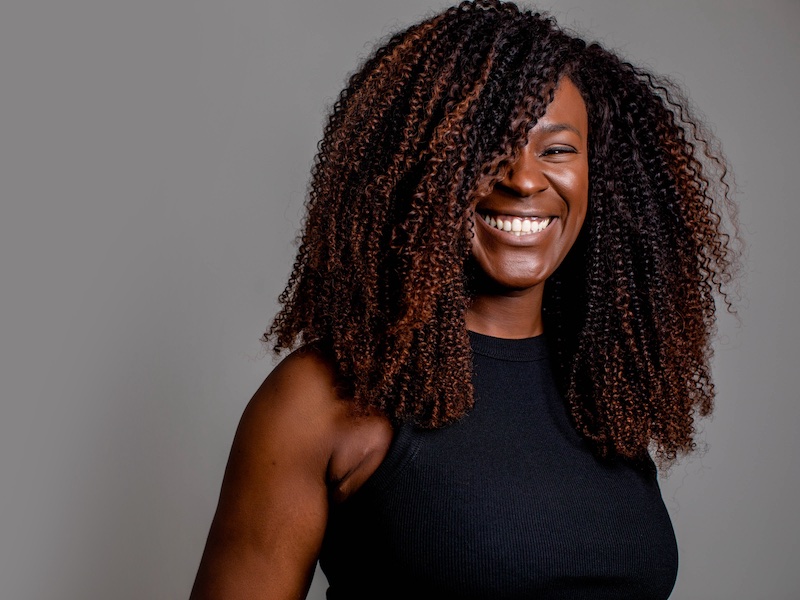Fifteen years ago, Julie Hadfield was an accountant at EY, and struggling with low confidence.
Now, she is a Partner at EY, mother of three young children, and co-creator of EY Absolute. It wasn’t easy, but she believes a combination of hard work, coaching and grit have empowered her to be more vocal about her ambitions and believe in herself. Today, she is a pro at setting boundaries and her colleagues know that she will not be in the office after 5:30pm. “If you’d told me where I’d be today fifteen years ago, I wouldn’t have believed you. Anything is possible, if you want it that much”, Julie says.
What have you learnt most about yourself through your career?
How much I love my job! I have been at EY for 15 years. In that time, I’ve had a lot of different roles and had three children, so of course there have been ups and downs, but the resilience I’ve gained from the variety of experience has been critical to my success.
I didn’t set out to be a Partner at EY. But during the Partner process, I realised how upset I would be if I didn’t get the role, and since then, I haven’t looked back.
What have you learnt most about yourself since becoming a working parent?
Not to put myself last. Even with my incredible support network, it’s easy to end up focusing on making sure everyone else – children, husband, family, nanny, colleagues – is happy, without thinking about yourself. It’s important to check in with yourself regularly and make sure you’re giving enough time to both home and work. Then, when things start tipping either way, you can redress the balance.
Did your career ambitions alter after having children?
Yes, in ways that I didn’t expect. After my first leave, I couldn’t imagine going back to work, and I took a year off. As soon as I went back, I realised how much I wanted to prove that I could perform as I had before having kids. People tend to think of mums providing ‘security’ for kids by being at home, but security can also mean building a stable infrastructure, and teaching them to be independent. As I have three young children, it’s particularly important to me that I provide the role-model of a mum who works in the same way as dad.
My husband is also a Partner in a Big Four firm, and before our first child we definitely prioritised his career. Coaching empowered me to be more vocal about my ambition. It taught me to say I really want this. When I told EY that I wanted to progress from Senior Manager to Director within months of being back from leave, they were surprised, I’m not sure anybody had realised just how ambitious I was. I went through the Director process while heavily pregnant with my second child. At the time, I kept thinking what am I doing, this is the time to be focusing on having children, but I do believe that if I had let my career ambitions drift at that point, I wouldn’t be where I am today.
Define a great leader. What traits do you think great female leaders possess?
Someone who role-models the type of behaviours critical to the culture of the business. A business like EY believes in flexibility, so our leaders have to be open about how they balance their work and family lives.
Leaders must be able to respond to people on an emotional level as well as a professional one. Plenty of men have high EQs, but in my experience, women are more likely to have the impulse to share their stories and bond with the person in front of them. Being a great leader means being able to put yourself in the shoes of the other person, so that you can deliver your message in a way that they will understand.
How do you balance being a mother and a successful professional?
The idea of ‘having it all’ is a myth. Ultimately, we’re all trying to do the same thing; we all want to be happy. After I had my first child, I worked four days a week, which ultimately meant being in the office until 11pm on Thursday. I consulted other female EY Partners about how they made it work, and after my second child, I came back 90%. I stopped staying late on Thursdays and started taking a half day on Fridays. I now work full-time but flexibly.
On any given day, I can take the children to school. I get home for bedtime every night, with very few exceptions. I often log back in later, but that’s for my own benefit, not because people are demanding things. It’s extremely rare that I’m in the office after 5.30pm. Over the last ten years, it has become more common for people to say, ‘I’m going home to put my children to bed. I’ll be back online later but I won’t be contactable for the next few hours,’ which is great, but you have to make sure those boundaries don’t slip, or people will take advantage.
I am present when I’m present; I work when I’m at work and I don’t spend my time at home on e-mail. I also buy extra holiday days, so that I can spend more quality time with my kids.
What are you really proud of in your career?
Becoming a Partner. I also co-built a new business within EY called EY Absolute, which provides bookkeeping, accounting and tax managed services via a cloud-based platform. We started with a blank piece of paper. Four years later, we’re trying to change the way EY works with clients in the Private Mid-Market. Over the past eighteen months, we have built a team of 55 people, all new to the firm. Every day brings a different challenge, because everything we’re doing is new. I’m proud that I stuck at it, because I could have given up so many times which is one of the reasons I love working with younger women who are at a different stage in their careers. I hope I’m a great example of how much an environment like EY and coaching can do. Five or ten years ago, I had a lack of confidence, and now I’m a Partner.
How has coaching helped? What have you learnt about yourself as a result of your coaching?
I’ve had several coaches over the years. I’ve worked with some great coaches – both internal coaches at EY as well as external specialist coaching providers like Talking Talent who, at the time, coached me through the parental transition.
Coaching has definitely helped me overcome my confidence problems. It’s so easy to get sucked into negative thought patterns like ‘I can’t do this’, or ‘It’s too hard,’ or ‘what if people don’t respect me’. Earlier on in my career, when someone criticised me, I found it hard to push back. Over time, and with the help of coaching, I’ve started believing in myself a lot more. Now, when someone challenges me, my default position is “I know as much about this as you do. I can do this.”
Coaching has also helped me realise how important it is to build relationships with stakeholders within the business. You have to be strategic about building an infrastructure and ask yourself, “Who are the 5 people I have to start working with in the next few years.” Each time I came back from maternity leave, my department had been restructured, but one of the stakeholders on my list became my sponsor, and she has been incredibly supportive.
It’s so helpful to have someone outside your job and friendship circle who can give objective views and put things in perspective. Too often, we end up focusing solely on delivery, rather than what we want from the future. Coaching provides a reflective space. It gives you a moment to think, ‘what am I doing’, ‘am I on track’. In coaching, we made timelines and plans which focused on my career development and ran alongside my job.
If you could change one thing about your working week, what would it be?
Better diary management. Less meetings. Occasionally, my PA blocks out a day in my diary, which really helps; sometimes what you need is a day to yourself to really think and do.
What advice would you give to others about how you made it work?
Never pretend that it isn’t hard. You have to really want it, and really love it. Self-discipline is key. I get up at 5:30am to set myself up for the day. I have consciously built an infrastructure around me that enables me to do my work. I have a supportive partner. We also have an incredible full-time nanny and my parents help a lot, even though they live in Manchester!
Make deliberate choices. There are still sacrifices at home and at work and you have to accept that and get on with it. I find it difficult to relinquish control; ideally, I want the house looking perfect and the kids calm before I leave the house, but sometimes that doesn’t happen. Some of the mums at my kids’ schools don’t work, so they’re present for day-to-day activities, which sometimes feels bad. But I’m there at every Sports Day and other important school events, and if I’m not then my husband is. I have pulled out of extremely important meetings in order to prioritise my children. My choices were recognised and rewarded later, but that doesn’t make it any easier in that moment.
Be yourself. Authenticity is a great way of building trust and relationships because people know you’re being honest.
Be clear. It is important to set clarity for what you want and/or need in your career and personal life and agree this with your key stakeholders to ensure that all needs are met – yours and theirs. Setting acceptable boundaries and regular communications is a key component of this.
Don’t just focus on yourself. You can be bold and ambitious, but being in a team isn’t about personal glory. It’s about collective glory, and when you have that mind-set, you’re both more pleasant to be around and more successful.
Finally, how do you hope the working world will change by the time your children are young professionals?
It has already changed for the better, but we have a long way to go. Work-life balance still needs to improve. People need to feel that they can achieve anything, regardless of background and gender. I want my kids to grow up surrounded by less stereotypes and more equality than I did.
Julie attributes her increased confidence and success to a process of proving herself, to herself, repeatedly. In doing this, Julie is providing a fantastic role-model to her son and daughters as well as living proof that motherhood may mean making sacrifices, but the choice between a family life or a career, isn’t a binary one you have to make.
About Talking Talent
Talking Talent are the world’s leading gender diversity experts. Our coaches and consultants empower individuals and enable organisations to create inclusive cultures that attract, retain and progress diverse talent, and measurably enhance business performance. Our executive coaches have commercial backgrounds and personal experience combining high demand roles with raising a family.










